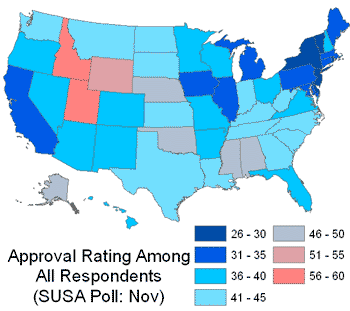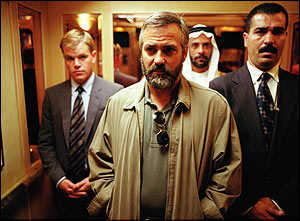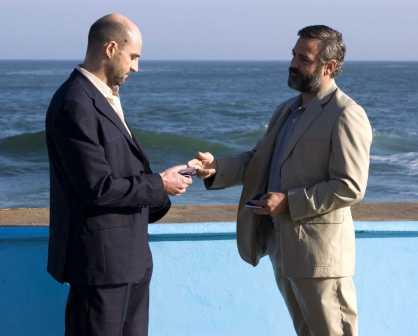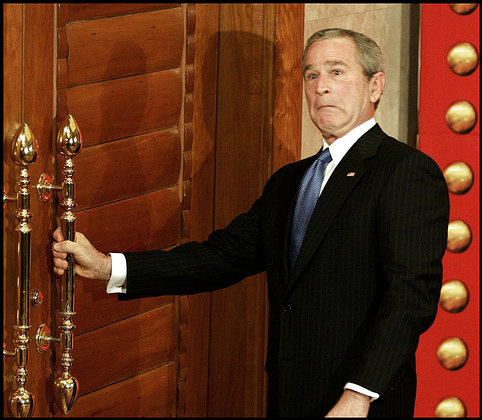Slate‘s John Dickerson and Bruce Reed try to disentangle Dubya and McCain, with Dickerson arguing McCain’s rationale for publicly supporting the prez and Reed explaining why Bush needs the mythical maverick.
Category: Politics (2005-2006)
Mission Accomplished (Again)?
“In short, Bush could pull a win-win-win out of this shift. He could pre-empt the Democrats’ main line of attack against his administration, stave off the prospect of (from the GOP’s perspective) disastrous elections in 2006 and ’08, and, as a result, bolster his presidency’s otherwise dwindling authority within his own party and among the general population.” Slate‘s Fred Kaplan argues that, despite the administration’s demagogic attacks of the past few weeks and recent reports of faith-based blinders, Dubya may well bow to reality and announce a phased withdrawal from Iraq in a speech tomorrow.
Update: Dubya sets the stage: “‘We will make decisions about troops levels based upon the capability of the Iraqis to take the fight to the enemy,’ Bush said in El Paso, Texas. ‘I will make decisions on the level of troops based upon the recommendations of commanders on the ground.'”
Update 2: Dubya makes his speech, and, in keeping with his usual MO, it’s basically just “stay-the-course” for now. Although, as suspected, he did argue that Iraqi forces have made great strides of late, which leaves the door open for withdrawal by Election Day 2006, as Murtha, Kaplan, and others have predicted.
Truth and Consequences.
As the State Department stalls for time, the European Union considers suspending the voting rights of those member nations which were home to secret CIA gulags. (Human Rights Watch has said that Poland and Romania are the most likely suspects, although many other nations may have witnessed CIA flights go to and fro.)
The Duke’s Demise.
Another week, another Republican goes to jail. Today, it’s Congressman Randy “Duke” Cunningham (R-CA), who once invoked 9/11 to push a flag-burning amendment and whom prosecutors have been eyeing for months. (“Duke,” “Hammer,” “Casino Jack,” “Scooter,” “Mayor of Capitol Hill”…really, the fact that every high-ranking GOP official has a street name should tell you something.) At any rate, Cunningham pleaded guilty ‘to charges of conspiracy to commit bribery, mail fraud and wire fraud, and tax evasion for underreporting his income in 2004.’…[P]rosecutors said Cunningham admitted to receiving at least $2.4 million in bribes paid to him by several conspirators through a variety of methods, including checks totaling over $1 million, cash, rugs, antiques, furniture, yacht club fees and vacations.“
Update: In related news, The Onion has more on the continuing GOP meltdown: “As of [last] Tuesday, Topeka mayor William Bunten, 74, is the nation’s highest-ranking Republican official not facing indictment or public reprimand. ‘I have always prided myself on running a clean campaign, a clean office, and cleaning house when necessary,’ Bunten said. ‘”However, I have no comment on the charges facing my party’s leadership, fundraising apparatus, known associates, or advisory staff.’“
Update 2: Via War Room, here’s Boss DeLay on his lieutenant back in June: “Duke Cunningham is a hero…He is an honorable man of high integrity.” Uh, yeah, if you say so.
Dubya the Dauphin Divine.
“After the September 11, 2001, terrorist attacks, the former official said, he was told that Bush felt that ‘God put me here’ to deal with the war on terror. The President’s belief was fortified by the Republican sweep in the 2002 congressional elections; Bush saw the victory as a purposeful message from God that ‘he’s the man,’ the former official said. Publicly, Bush depicted his reelection as a referendum on the war; privately, he spoke of it as another manifestation of divine purpose.” By way of Salon‘s War Room, The New Yorker‘s Sy Hersh scrutinizes the terrifying dogmatism and tone-deafness at work in the White House with regards to Iraq.
Here’s more: “[Rove and Cheney] keep him in the gray world of religious idealism, where he wants to be anyway,’ the former defense official said. Bush’s public appearances, for example, are generally scheduled in front of friendly audiences, most often at military bases. Four decades ago, President Lyndon Johnson, who was also confronted with an increasingly unpopular war, was limited to similar public forums. ‘Johnson knew he was a prisoner in the White House,’ the former official said, ‘but Bush has no idea.’“
Update: According to the Daily News, who published a similar story yesterday, the White House won’t comment on the Hersh piece.
2nd Time Around.
Meanwhile, the investigations continue. This weekend, Time reporter Viveca Novak announced she’s cooperating with Plamegate prosecutors, who have been asking her about her conversations with Robert Luskin, Karl Rove’s attorney, beginning in 2004. Doesn’t sound like Rove is off the hook, does it? Update: Apparently, Novak was Rove’s alibi: “‘This is what caused [Fitzgerald] to hold off on charging’ Rove, the source said. But another person familiar with the conversations said they did not appear to significantly alter the case.“
Almost Blue.

As seen at many fine blogs this past Thanksgiving week (including FmH & Medley), some nice visual data to be thankful for (and for all those red state/blue state dualists to ponder): One year after Election 2004, America’s blue over Dubya.
The Oil Down the Desert Way.
 While perhaps a bit too dry and convoluted for some tastes, Stephen Gaghan’s Syriana is, IMHO, a top-notch political thriller that’s easily one of the best films of the year. Admitedly, the movie is missing some of the Soderberghian visual flourishes that made the very similar Traffic so memorable, and the movie definitely can be tough to follow. But, in a way, that’s part of its charm — Like the film’s protagonists, we only occasionally glimpse the shadowy tendrils of the beast that is Big Oil, and come to share their despair that it can ever be subdued. In sum, like the other recent Clooney outing, Good Night, and Good Luck, Syriana is both an intelligent, compelling work of cinema and a enthralling piece of social commentary, one that not only feels pertinent but necessary.
While perhaps a bit too dry and convoluted for some tastes, Stephen Gaghan’s Syriana is, IMHO, a top-notch political thriller that’s easily one of the best films of the year. Admitedly, the movie is missing some of the Soderberghian visual flourishes that made the very similar Traffic so memorable, and the movie definitely can be tough to follow. But, in a way, that’s part of its charm — Like the film’s protagonists, we only occasionally glimpse the shadowy tendrils of the beast that is Big Oil, and come to share their despair that it can ever be subdued. In sum, like the other recent Clooney outing, Good Night, and Good Luck, Syriana is both an intelligent, compelling work of cinema and a enthralling piece of social commentary, one that not only feels pertinent but necessary.
As you probably know, the movie jetsets around the globe following several facets of the oil trade and its consequences. In Beirut, an aging, disgruntled CIA agent (a stout George Clooney, resembling in Stephanie Zacharek’s words a “depressed circus bear”) starts to ask questions above his pay-grade about the collateral damage from a recent operation. In Geneva, after a family tragedy, a fresh-faced energy analyst (Matt Damon) becomes consigliere to the ambitious heir (Alexander Siddig) of a Middle-Eastern emirate. In Washington DC, a resourceful lawyer (Jeffrey Wright) begins due diligence work on an merger between two oil firms (the smaller headed by Chris Cooper). And, on the oil fields themselves, an increasingly desperate Pakistani emigrant (Mazhar Munir) begins to contemplate drastic action to change his fortunes, and those of his family.
 Along the way, Syriana‘s narrative is further fractured by the comings and goings of other famous faces, including Amanda Peet as Damon’s suffering wife, William Hurt as another grizzled agency vet, Tim Blake Nelson as the poster child for Abramoff‘s America, and Christopher Plummer as an insider among insiders. But, even though Plummer comes closest to being the Cigarette Smoking Man of this particular conspiracy tale, Syriana doesn’t offer any quick fixes or easy answers to the often grim story that unfolds. Some of our heroes find redemption or closure, true, but others become resigned to their fate, or even corrupted. And, ultimately, there is no Big Reveal or cathartic Speaking-Truth-To-Power scene to offer solace to the audience — Instead, we’re confronted with a system that, for better or worse, lumbers on, oblivious to either the machinations or the protests of mere individuals.
Along the way, Syriana‘s narrative is further fractured by the comings and goings of other famous faces, including Amanda Peet as Damon’s suffering wife, William Hurt as another grizzled agency vet, Tim Blake Nelson as the poster child for Abramoff‘s America, and Christopher Plummer as an insider among insiders. But, even though Plummer comes closest to being the Cigarette Smoking Man of this particular conspiracy tale, Syriana doesn’t offer any quick fixes or easy answers to the often grim story that unfolds. Some of our heroes find redemption or closure, true, but others become resigned to their fate, or even corrupted. And, ultimately, there is no Big Reveal or cathartic Speaking-Truth-To-Power scene to offer solace to the audience — Instead, we’re confronted with a system that, for better or worse, lumbers on, oblivious to either the machinations or the protests of mere individuals.
Depressing, indeed, even despairing at times, this film still feels like a story that must be told. And while viewers may quibble with some of the details of Gaghan’s Tarbell-esque expose of the political economy of oil, hopefully most will agree: We need more movies like Syriana.
Murtha’s Law.
“It almost doesn’t matter whether withdrawing or redeploying the troops is a good idea; it’s simply going to happen because there is no way for it not to happen (short of a major act of political will, such as reviving the draft or keeping troops on the battlefield beyond reasonable endurance). This is what Murtha meant when he told Russert, ‘We’re going to be out of there, we’re going to be out of there very quickly, and it’s going to be close to the plan that I’m presenting right now.'” Cutting through the congressional anger and the “cut and run” cheapshots, Slate‘s Fred Kaplan explains exactly what John Murtha called for last week, and why. “John Murtha’s proposal leaves open a lot of questions, but — seen for what it really says, not for how it’s been portrayed — it’s a start.”
No more Dodges / inCurious George.
“I was trying to escape. Obviously, it didn’t work.” If it’s any consolation, Dubya, we all feel just as trapped. In one of those resounding visual metaphors that capture a presidency and that life occasionally kicks up for all to see (the last one being Dubya’s fiddling during Katrina), our leader gets stymied by a locked door while trying to evade a reporter’s questions about his China trip (which were pretty softball, given all the things he could’ve been asking these days.)
In somewhat related news, in the relatively sanguine Post story about the door incident, the following depressing information is included: “In five years in the presidency, Bush has proved a decidedly unadventurous traveler…As he barnstormed through Japan, South Korea and China, with a final stop in Mongolia still to come, Bush visited no museums, tried no restaurants, bought no souvenirs and made no effort to meet ordinary local people…[Laura Bush] once persuaded him to go to the Hermitage Museum in St. Petersburg, only to see him burn through the place in 30 minutes. He dispensed with the Kremlin cathedrals in Moscow in seven minutes. He flatly declined an Australian invitation to attend the Rugby World Cup while down under.”

